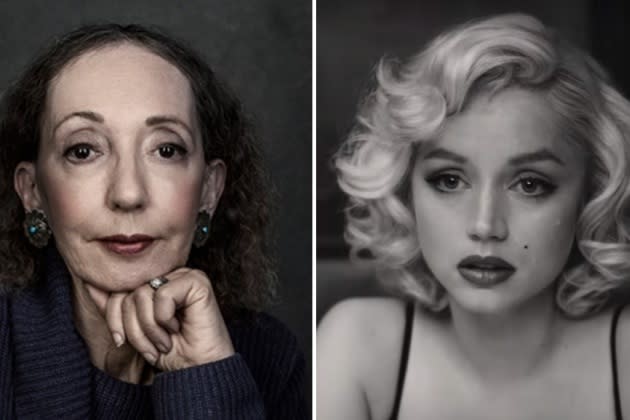
“Blonde” author Joyce Carol Oates, who penned the biographical fiction novel that the Netflix film is based on, has weighed in on the discourse surrounding Andrew Dominik’s controversial portrait of Marilyn Monroe. On Friday, Oates answered some burning questions from fans via Twitter, including about backlash the film has received that it exploits Monroe’s trauma.
Dubbed a fictionalized retelling of the movie star’s life and untimely death, “Blonde” loosely recreates several tragedies during the life of Monroe (Ana de Armas), including the abuse she endured from her mother and the sexual assaults she experienced in Hollywood. In addition to fan outrage on social media, the movie has also been panned by several film critics, including The New York Times’ Manohla Dargis, who wrote in her review: “Given all the indignities and horrors that Marilyn Monroe endured during her 36 years, it is a relief that she didn’t have to suffer through the vulgarities of ‘Blonde,’ the latest necrophiliac entertainment to exploit her.”
More from Variety
When asked for her review of the film, Oates — who was not involved in the movie’s production beyond it being based on her book — tweeted: “I think it was/ is a brilliant work of cinematic art obviously not for everyone. Surprising that in a post#MeToo era the stark exposure of sexual predation in Hollywood has been interpreted as ‘exploitation.’ Surely Andrew Dominik meant to tell Norma Jeane’s story sincerely.”
Oates continued in another tweet, saying that the film is “not for the faint of heart.”
“The director is unflinching, intransigent,” she added. “The last 20 minutes or so are almost too powerful to be viewed. Over all, brilliant cinematography & performance by Ana de Armas.”
In regards to Monroe’s sexual exploitation, Oates wrote that including her experience in the book and film is a way to expose those that harmed her, as it was not possible for Monroe to speak out in her lifetime.
“For the young starlet Norma Jeane Baker, there was no possibility of her ‘telling’/ ‘reporting’ a rape. No one would have believed a starlet, or cared; & she would have been dropped from the studio & blacklisted. So, the movie ‘Blonde’ exposes the rape, 50 or 60 years later,” Oates wrote. “The cruel exploitation of Marilyn Monroe by, among others, John F. Kennedy is well known to biographers of both MM & Kennedy; but the treatment on screen is difficult for some viewers to see, so suggest just do not see it.”
Oates also compared the film to a Rorschach test, in which different people see different images appear in ink blots. “Some see the exposure of sexual mistreatment of Marilyn Monroe as ‘exploitation’ & others see it as a revelation of how a gifted young woman was treated in Hollywood & elsewhere, pre#MeToo,” she wrote.
“Blonde” is now streaming on Netflix.
Best of Variety
Sign up for Variety’s Newsletter. For the latest news, follow us on Facebook, Twitter, and Instagram.




